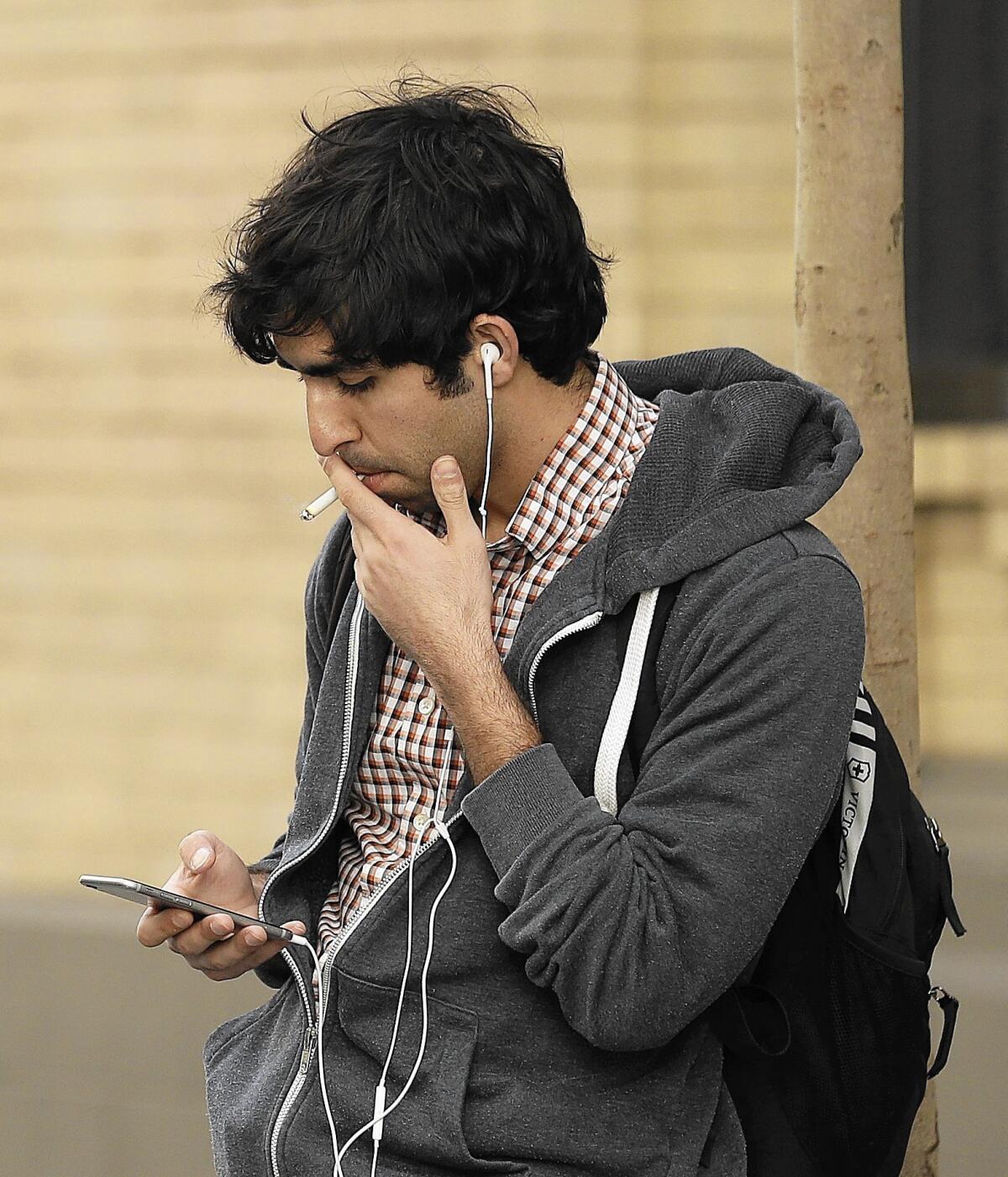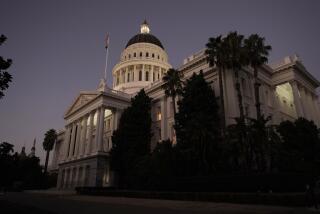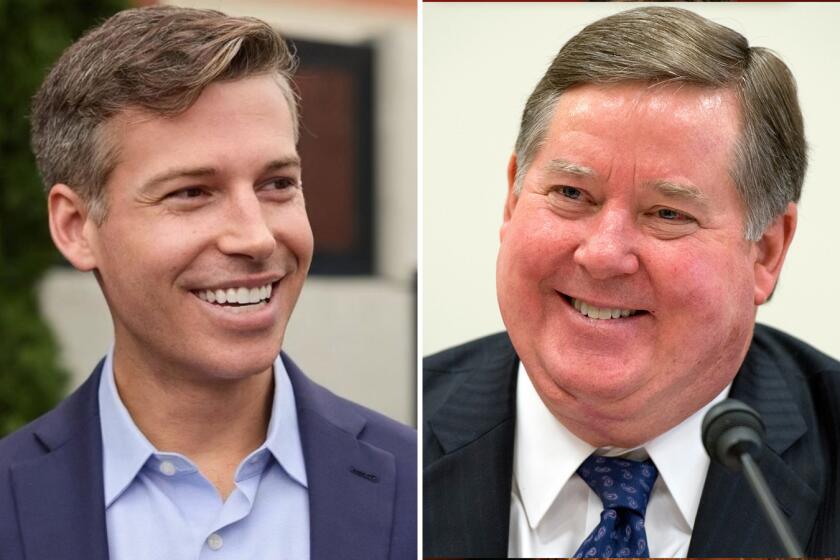Capitol Journal: Lawmakers show surprising courage against Big Tobacco

Lawmakers approved a bill to raise the smoking age from 18 to 21. Another bill approved by the Legislature would regulate electronic cigarettes like tobacco.
in sacramento — The Legislature showed some guts last week in standing up to the tobacco lobby and its political money.
It could have shown more, however, by mustering the courage to raise taxes on cigarettes, cigars and chewing crud.
California’s tobacco tax is among the lowest in the nation and hasn’t been hiked since 1998 — and then only by the voters, not the weak-kneed legislators.
The national average state cigarette tax is $1.61 per pack. California’s is about half that, 87 cents. We rank 35th. New York is first at $4.35.
But give our lawmakers credit: They did the next best thing, even if it was a punt to local government. They passed a bill allowing counties to seek voter approval of a local tobacco tax.
The tax revenue could be used to help smokers kick the habit and treat their tobacco-related ailments.
The main purpose, however, is to discourage people from buying smokes, a strategy that works — and worries cigarette makers. Researchers have found that for every 10% increase in the cigarette price, there’s a 4% reduction in use.
Let’s put the rap on legislative fortitude in perspective: To pass any tax increase, a two-thirds vote is needed. Passing a bill that allows someone else to raise a tax requires only a simple majority, which Democrats can handle without buying off Republicans.
The local tax bill, by Assemblyman Richard Bloom (D-Santa Monica), passed the Assembly on a 46-27 vote, far short of the 54 needed for two-thirds.
“Tobacco is a poison,” Bloom told me. “We shouldn’t even be debating this anymore. We should be doing everything to keep it out of the hands of young people.”
It was a bad day for tobacco interests. The Assembly passed two other bills that could have even greater immediate impact.
One, by Sen. Ed Hernandez (D-West Covina), would raise the smoking age from 18 to 21.
Opponents argued it wouldn’t be fair that someone under 21 could die for their country but couldn’t smoke. So active military personnel were exempted.
The bill passed 49 to 25.
Hernandez says research shows that 90% of smokers begin puffing before age 21, and 80% before 18.
San Francisco last week raised its smoking age to 21. So have Hawaii and New York City.
But I’m skeptical. Come on! We can’t even enforce the age 18 limit. Kids get smokes at 14 or whenever they want.
Yes, argue the proposal’s advocates, but the 14-year-olds get their cigarettes from 18-year-olds. They wouldn’t be close enough to the 21-year-olds.
Perhaps. But what’s to stop the 18-year-olds from being supplied by those who are 21, and then passing them down to little sister?
The second big bill that passed makes total sense and is overdue. The measure, by Sen. Mark Leno (D-San Francisco), would regulate electronic cigarettes like tobacco. Their use would be prohibited everywhere cigarettes are banned: in restaurants, theaters and other public places.
These cute vapor devices are particularly appealing to minors, sold with yummy flavors such as chocolate, cotton candy and cherry — and usually laced with addictive nicotine.
The bill passed 52 to 21.
One Los Angeles study, Leno says, found that 9th-graders who use e-cigarettes are four times as likely to get hooked on tobacco.
“Clearly, Big Tobacco’s next move is to addict a new generation to nicotine,” Leno says.
Three other anti-smoking bills also passed the Assembly the same day. One would close loopholes in the state’s smoke-free workplace laws. Another would require all schools to be tobacco free. The third would impose a state licensing fee on tobacco retailers.
Passage of the six-bill package earned kudos for Speaker Toni Atkins (D-San Diego) on her last day as Assembly leader. Assemblyman Anthony Rendon (D-Paramount) takes over this week.
Last year, the tobacco lobby and its legislative minions stalled the bills in the Assembly after two key measures — raising the smoking age and regulating e-cigarettes — passed the Senate.
One reason is obvious: So far in this election cycle, the major tobacco companies have plied legislators with nearly $364,000 in campaign contributions, according to MapLight, which tracks political money. Of that, 83% has gone to Republicans — who make up only 35% of the Legislature — and 17% to Democrats.
Add the last election cycle to this one, and Big Tobacco has donated $894,000, 71% to Republicans and 29% to Democrats.
Most Democrats voted for the anti-tobacco legislation. Most Republicans voted against.
The Senate intends to approve Assembly amendments and send the entire package to noncommittal Gov. Jerry Brown this week. Unless.
Behind the scenes, Senate leader Kevin de León (D-Los Angeles) quietly is offering to negotiate with tobacco. If the industry were to allow the Legislature to pass a state tobacco tax, perhaps some of the package could be snuffed.
Then sponsors of a November ballot initiative that would raise the state cigarette tax by $2 per pack might be persuaded to withdraw their measure. That would save the tobacco industry upward of $100 million fighting the initiative.
And unions that are pushing it could plow their money into Democratic legislative races instead. Plus, there wouldn’t be a tobacco tax on the ballot to complicate life for a union-sponsored extension of Brown’s soak-the-rich income tax hike.
It’s all very complex. And unlikely. The Legislature has exhibited about all the courage it can against terrifying tobacco.
Twitter: @LATimesSkelton
ALSO
Assembly approves raising smoking age to 21
A threat ahead: California Democrats losing the fight for younger voters
These are the lawmakers who went to lavish Maui conference. Here’s who paid.
More to Read
Get the L.A. Times Politics newsletter
Deeply reported insights into legislation, politics and policy from Sacramento, Washington and beyond. In your inbox three times per week.
You may occasionally receive promotional content from the Los Angeles Times.











